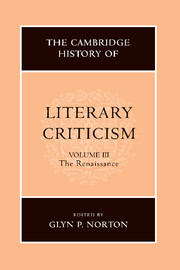Book contents
- Frontmatter
- Introduction
- READING AND INTERPRETATION: AN EMERGING DISCOURSE OF POETICS
- POETICS
- I Humanist classifications
- 7 Humanist classifications of poetry among the arts and sciences
- 8 Theories of poetry: Latin writers
- II The rediscovery and transmission of materials
- III Rhetorical poetics
- IV Literary forms
- THEORIES OF PROSE FICTION
- CONTEXTS OF CRITICISM: METROPOLITAN CULTURE AND SOCIO-LITERARY ENVIRONMENTS
- VOICES OF DISSENT
- STRUCTURES OF THOUGHT
- NEOCLASSICAL ISSUES: BEAUTY, JUDGEMENT, PERSUASION, POLEMICS
- A SURVEY OF NATIONAL DEVELOPMENTS
- Bibliography
- Index
- References
8 - Theories of poetry: Latin writers
from I - Humanist classifications
Published online by Cambridge University Press: 28 March 2008
- Frontmatter
- Introduction
- READING AND INTERPRETATION: AN EMERGING DISCOURSE OF POETICS
- POETICS
- I Humanist classifications
- 7 Humanist classifications of poetry among the arts and sciences
- 8 Theories of poetry: Latin writers
- II The rediscovery and transmission of materials
- III Rhetorical poetics
- IV Literary forms
- THEORIES OF PROSE FICTION
- CONTEXTS OF CRITICISM: METROPOLITAN CULTURE AND SOCIO-LITERARY ENVIRONMENTS
- VOICES OF DISSENT
- STRUCTURES OF THOUGHT
- NEOCLASSICAL ISSUES: BEAUTY, JUDGEMENT, PERSUASION, POLEMICS
- A SURVEY OF NATIONAL DEVELOPMENTS
- Bibliography
- Index
- References
Summary
The literary criticism of the first thirty years of the sixteenth century is best pursued in commentaries published in the margins of particular poetic texts and in the rambling miscellanies in which humanist scholars amassed the notes they made on their reading. Only belatedly did coherent theory begin to emerge from pedagogic practice. One of the earliest new works of the century devoted solely to the theoretical discussion of poetry was also destined to be the most successful. Girolamo Vida published his verse De arte poetica at Rome in 1527. The work is divided into three books by and large equivalent to the rhetorical distinctions of invention, disposition, and elocution. Its content derives from the key concepts of Horace, amplified by reference to rhetorical precepts, laced with a measure of Platonic enthusiasm, and expressed wherever possible in exemplary Virgilian language. The young poet is to peruse all nature, searching through a thousand shapes in which to embody thought, but, more often than not, it is the plenteous store of memory that comes to his aid, well stocked from the literary education advertised in Book I of Vida's poem (1.427–37). Vida's concern, and it is a concern which is altogether typical of the humanist literary theorist, is not with the reference poetic fiction makes to the realities of nature, but with the reference it makes to other literary texts. The art of poetry is the art of imitating the words of other poets rather than the art of imitating things, and Vida's model of artistic perfection and of poetic truth is Virgil.
- Type
- Chapter
- Information
- The Cambridge History of Literary Criticism , pp. 98 - 106Publisher: Cambridge University PressPrint publication year: 1999
References
- 2
- Cited by

